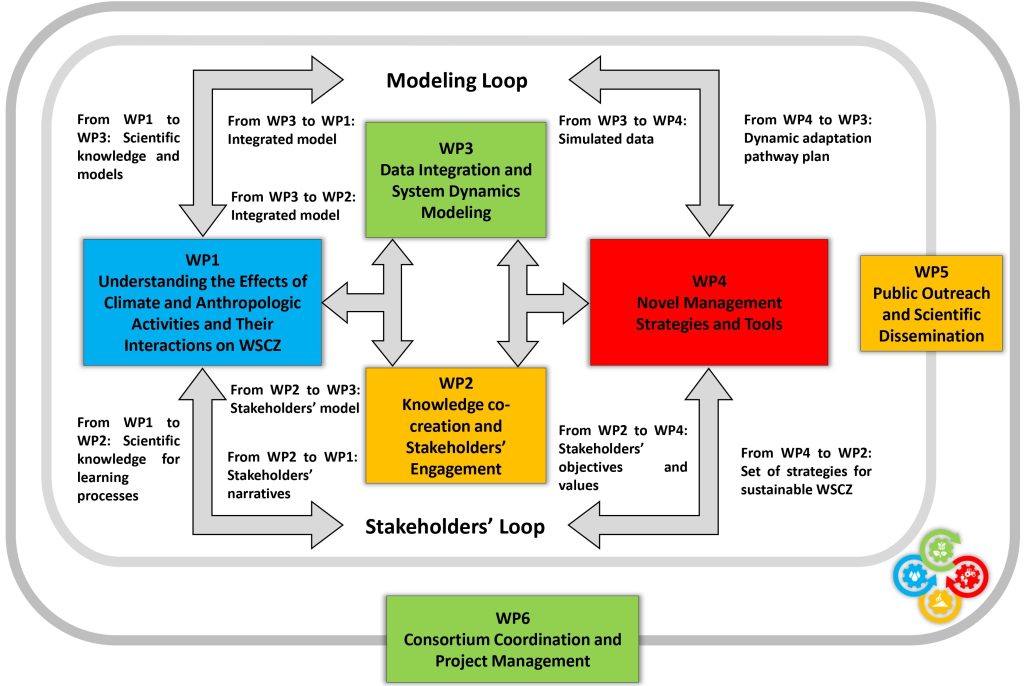
INTERACTION focuses on the integrated scientific-stakeholder modeling of WSCZ

INTERACTION spans three years, from 2021 to 2024

INTERACTION brings together partners from Italy, Qatar, and the USA

INTERACTION addresses WSCZ challenges on three continents with a versatile novel approach
The INTERACTION project is a collaborative effort funded by the Belmont Forum’s Collaborative Research Action (CRA) on the theme “Towards Sustainability of Soils and Groundwater for Society” (Soils2020). It involves partners from three countries: Italy, Qatar, and the USA. The consortium, formerly led by Purdue University (USA), is titled “Integrated Assessment of Climate Impacts on Ecosystem Functions and Productivity of Critical-Zone Eco-Hydrology.”
The project offers a novel approach to managing the environmental risks, climate change, and anthropogenic impacts on Water-Scarce Critical zones (WSCZ). INTERACTION combines scientific research and modeling with stakeholder engagement aiming at co-creating science-based knowledge on WSCZ sustainability while including environmental, socio-economic, and institutional aspects and multi-stakeholders’ perspectives.
To tackle the challenge, INTERACTION has a multi-disciplinary team with heterogeneous expertise ranging from environmental and socio-economics analysis, numerical modeling, soil and groundwater hydrogeology, and climate change modeling and assessment. The project partnership includes prestigious research institutions in Italy, Qatar, and the USA covering a variety of multi-disciplinary fields.
Coastal aquifers in arid and semi-arid regions face significant vulnerability due to high population density, extensive groundwater usage, climate change impacts, and rising sea levels. These result in groundwater quantity and quality degradation, salinization of agricultural soils, disruptions to coastal wetlands, and consequently ecosystem degradation. The long-term effects of anthropogenic activities on these systems are not yet fully understood, hindering their management.
Traditional approaches tend to study climate change, vadose zone, surface and groundwater, and human activities in isolation, overlooking their interconnected and nonlinear relationships as interdependent systems. However, adopting a holistic perspective considering the complex interactions among physical, anthropogenic, and socio-economic factors can provide more effective solutions to address sustainability challenges in water-scarce coastal areas. Understanding these interactions is essential for defining pathways to achieve sustainability in Water-Scarce Critical Zones (WSCZ).
Our research is steered by the following core questions:
As part of the Collaborative Research Action (CRA), the INTERACTION project aims at advancing the knowledge on human – WSCZ coupled system and its sustainability involving the local stakeholders. This involves two key objectives:
The main innovation of the project is the development of a science-based knowledge framework on WSCZ sustainability challenges via a cross-disciplinary approach including socio-economic and institutional aspects and multi-stakeholder’s perspectives, collected as “narratives”. The integration between narratives and models will contribute to define “sustainable adaptation pathways” that describe the dynamic evolution of the WSCZ systems in the next 10-20 years, accounting for the uncertainties related to climate change, land use patterns and human behaviors.
INTERACTION uses science-based methodologies integrated with stakeholders’ engagement for better understanding and modeling the dynamics of the WSCZ in the three case studies.
– Two loops are identified: a modeling and a stakeholder loop eventually leading to define novel management strategies and tools.
– Four main Working Packages (WPs) have been designed to tackle specific issues:
WP1: Understanding the effects of climate and anthropogenic activities and their interactions on WSCZ
WP2: Knowledge co-creation and stakeholders’ engagement
WP3: Data integration and system dynamics modeling
WP4: Novel management strategies and tools
– WP5 and WP6 cover the project management and organization, the data sharing, and the public outreach coordination.

INTERACTION project methodology flowchart.
The INTERACTION project is anticipated to yield several significant outcomes, including:

Assessment of current and future impacts on groundwater and soil in water- scarce environments

Prediction of possible environmental and socio-economic scenarios for WSCZ sustainability

Guidelines to design policies and incentives to enhance the long-term economic and environmental quality in WSCZ

Freely and openly available data and models aimed to long-term dissemination and reuse of the project’s results
By achieving these expected outcomes, the project seeks to advance knowledge and understanding of WSCZ dynamics, engage stakeholders in decision-making processes, and provide actionable recommendations for sustainable management practices.